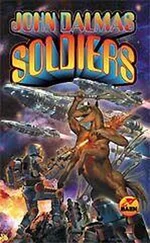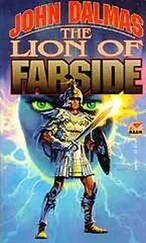John Dalmas - Return to Fanglith
Здесь есть возможность читать онлайн «John Dalmas - Return to Fanglith» весь текст электронной книги совершенно бесплатно (целиком полную версию без сокращений). В некоторых случаях можно слушать аудио, скачать через торрент в формате fb2 и присутствует краткое содержание. Жанр: Фэнтези, на английском языке. Описание произведения, (предисловие) а так же отзывы посетителей доступны на портале библиотеки ЛибКат.
- Название:Return to Fanglith
- Автор:
- Жанр:
- Год:неизвестен
- ISBN:нет данных
- Рейтинг книги:4 / 5. Голосов: 1
-
Избранное:Добавить в избранное
- Отзывы:
-
Ваша оценка:
- 80
- 1
- 2
- 3
- 4
- 5
Return to Fanglith: краткое содержание, описание и аннотация
Предлагаем к чтению аннотацию, описание, краткое содержание или предисловие (зависит от того, что написал сам автор книги «Return to Fanglith»). Если вы не нашли необходимую информацию о книге — напишите в комментариях, мы постараемся отыскать её.
Return to Fanglith — читать онлайн бесплатно полную книгу (весь текст) целиком
Ниже представлен текст книги, разбитый по страницам. Система сохранения места последней прочитанной страницы, позволяет с удобством читать онлайн бесплатно книгу «Return to Fanglith», без необходимости каждый раз заново искать на чём Вы остановились. Поставьте закладку, и сможете в любой момент перейти на страницу, на которой закончили чтение.
Интервал:
Закладка:
Arno chuckled. "And in Normandy he was baptized at last, having seen, if not the truth of God, at least the daughter of William of Courmeron, who would not give her in marriage to a heathen. When William died without living sons, great-grandsire received the fief from the duke. From heathen Viking to Christian baron in a ten-year! By then he'd learned to ride with all but the best of them, though he swore he'd been fortunate to survive some of those wild early hunting rides through the forest.
"Then, when I was six, I was sent to serve at the castle of Hugh of Falaise, Roland's father, a man far nobler than his son would ever be. At certain holidays, we pages and squires would go home. Great-grandsire had entered his dotage, and somehow could no longer speak French, but only Norse, which, since grandsire's death, no one else there could speak except myself. Even from his Norse the French words all had fled, so that I had trouble understanding him at first. But because I could at least somewhat understand him, I spent much of my time with him when I was home. Until, when I was twelve, I was called to weep beside his bier."
I'd never thought of Arno weeping, even as a kid. He wasn't chuckling now; he wasn't even smiling.
"They said he'd regained both his French and his full wits on his last day, and, calling for the priest, had been absolved of all his sins, which I doubt not were less numerous and fulsome than those of many men who'd been Christian from the womb."
Arno shook his head as if throwing off a sense of loss. "I had not heard the Norse language again until today, and indeed could speak it only with difficulty at first."
"What did you talk about?" I asked.
"The leader's name is Gunnlag Snorrason, and he has accepted my oath. I am now one of his men. He was a Varangian himself once, and had fought against Normans in Apulia. Others of his men had fought Normans in Greece, or fought beside Norman mercenaries against the Patzinaks. The Varangians know the strength of Norman arms, and when they found that I could speak their tongue, albeit haltingly, they were pleased to have me. In fact, it clearly amused them to have a Norman in their ranks. To them I am a sport, like a Saracen bishop in God's church."
He chuckled, grinning ruefully. "Gunnlag Snorrason is no son of Tancred-no Roger de Hauteville, no Robert Guiscard or William Fer de Bras-and this vessel is all there is of his domain. But it is far far better than the cinnabar mines of Spain, where it is told the slaves live short and sickly lives and there is always a demand for more to replace the dying. And I can like these Varangians, for if they have learned to admire Normans in battle, Normans have learned that Varangian strength and valor is hardly second to our own. Were it not for Varangians, Guiscard might well rule not from Palermo but from Byzantium itself, and not a dukedom but an empire."
Later, Arno's cheerful mood turned somber, and that evening before we slept, he let me see what was bothering him.
"Larn," he said.
"Yes?"
"Why didn't your sister drive the Varangians away?
With her mighty weapons, she could have sent them to the bottom."
I lied to him. "I don't know why. She has other things to do than hang around taking care of me. And until today, you've had my speaking amulet. I haven't been able to keep in touch with her."
"Can you call her now?"
"I tried. She didn't answer." I took my communicator off my belt, switched it on, and murmured into it. "Deneen, this is Larn. Deneen, this is Larn. Come in, please. Over."
As I spoke, I had this feeling that she was going to surprise me and answer, but she didn't. Shrugging, I switched it off and put it back on my belt. "It seems to be working," I told him.
"I just don't get an answer. But it only works over a few hundred miles. She's probably farther away than that."
He pursed his lips thoughtfully. I wished I was like Bubba and could read thoughts.
TWENTY-ONE
Late that night I woke up. I'd been dreaming of Jenoor, and in my dream she'd been alive, talking to me. I couldn't remember much about it, except she'd been telling me she was all right. I also remembered that in the dream it seemed as if she'd come to me in dreams before.
It had been such a joyous dream; now it was gone. I lay there for a minute, trying to remember more of it, but couldn't. Even what I did remember was slipping away, and a slow wave of despair washed through me. Getting up, I looked around. To the right of the long ship I could see a low coastline not many miles away beneath a fall moon.
One of the Varangians had wakened at my movement and was watching me. I ignored him and went aft to where the water casks were lashed, for a drink, being careful not to step on anyone. I thought about talking to the steersman, getting into the Norse language the way I had Provencal, by gestures and pointing. I decided that wouldn't work too well with him handling the steering oar, so I went back and lay down again, where I dreamed some more about Jenoor.
But the next time I woke up, the sun was rising behind us, which told me we'd changed direction from south to westerly. The wind had shifted, too, coming out of the northeast. The square sail billowed roundly, and we were moving right along.
The most surprising change was that we were towing the horse ship now! Its own sail was full like ours, but the line was taut; we were adding to her speed, though it slowed us down. I called to the Greek-his name was Michael-and asked if he knew what that was about.
"We are entering waters where Saracen pirates and warships are more likely to be met," he said. "Our captain"-he meant the Varangian captain now-"wants to pass through them as swiftly as possible without separating from the other." He gestured toward the horse ship some hundred feet behind us.
And he really did want to get through fast. First we ate breakfast, which was the same as supper had been the day before: dates, smoked meat, and a hard, flat, crusty thing that the Norse called flatbraud, all washed down with watered wine. As soon as we'd finished, men were assigned to the rowing stools. Sliding the oars through the oar holes, they began to row in rhythm. It had to be in rhythm, or they'd have been banging oars together. An overweight Varangian with a hand missing set the rhythm of their stroke by striking a drum.
No question about it-we were going faster now.
I began to see a long, hard day ahead. Not all the oars were in use; only about half the Varangians were rowing. It didn't take too much imagination to see what would happen after they'd rowed a while: The rest of us would replace them. I looked at my hands. There wasn't a callus on either of them. Then I looked around for something I could make a sun visor with. I wasn't nearly as tanned as the Varangians, and I didn't want my face to slough off at the end of a day on a rowing stool.
Sure enough, row I did. One shift would row for an hour-the one-handed bosun had an hourglass-then the other would take over. At midday we all quit rowing to eat lunch, which was the same as breakfast, followed by a longish rest, during which most of us slept. Then the rowing began again. Before my first shift I cut cloth pads from my cape to protect my hands, and I'm sure it helped, but even so, before the day was done, my palms were raw and oozing. The only good thing I could say about it, if you could call it good, was that I'd sort of gotten used to the pain. At the end of the first shift, I leaned over the gunwale and scooped up a bucket of salt water from the sea. After each shift I soaked my hands in it, though it stung. I wasn't sure the immunoserum would keep my blisters from getting infected, and a saltwater soak was the only treatment I could think of.
To start with, I told the captain I'd never rowed before, and asked for some coaching. Instead of a coach, he gave me the rearmost starboard oar, with no one on the next two stools in front of me. I saw why quickly enough. The long ship was rolling more than a little, and for the first couple of minutes I kept missing the water every few strokes, fanning the air. Then I got grooved in and it went pretty decently. After a while, I was even digging the water about the same each stroke.
Читать дальшеИнтервал:
Закладка:
Похожие книги на «Return to Fanglith»
Представляем Вашему вниманию похожие книги на «Return to Fanglith» списком для выбора. Мы отобрали схожую по названию и смыслу литературу в надежде предоставить читателям больше вариантов отыскать новые, интересные, ещё непрочитанные произведения.
Обсуждение, отзывы о книге «Return to Fanglith» и просто собственные мнения читателей. Оставьте ваши комментарии, напишите, что Вы думаете о произведении, его смысле или главных героях. Укажите что конкретно понравилось, а что нет, и почему Вы так считаете.







